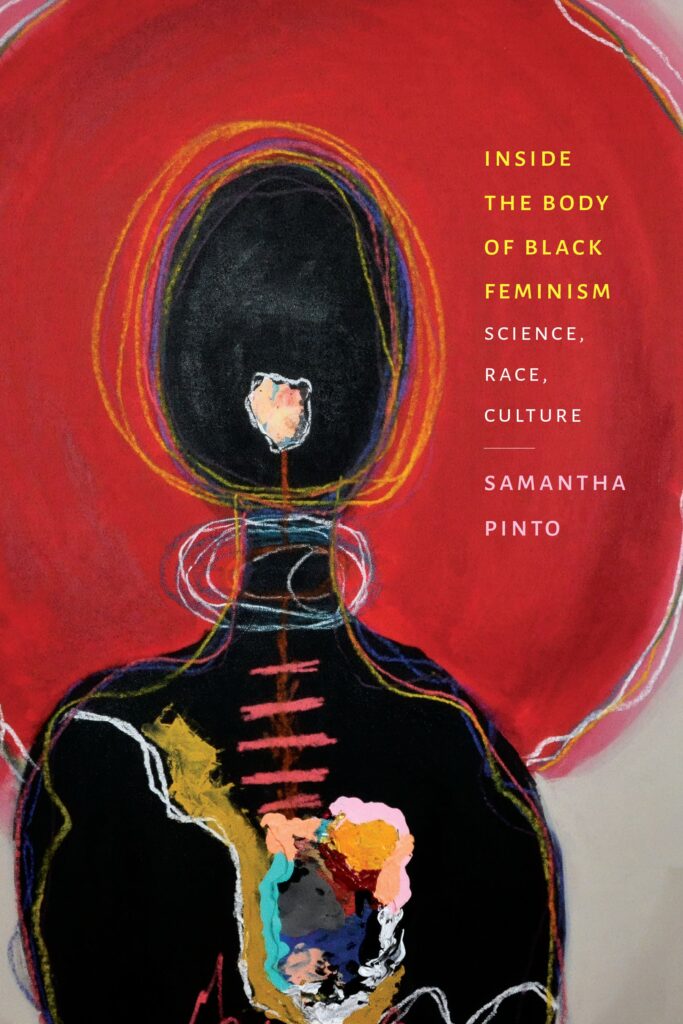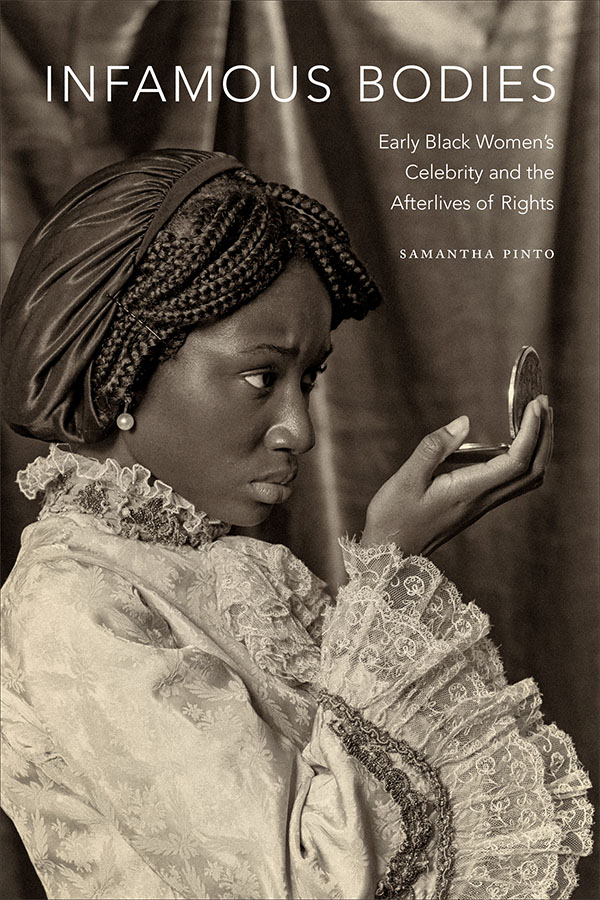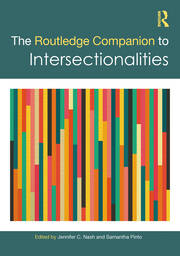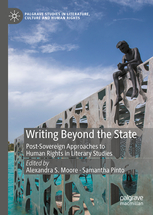Publications
Books

Inside the Body of Black Feminism (Duke University Press, 2026) charts a cultural genealogy of anti-racist & feminist engagement with some of the most objectified internal “parts” of racist medical and scientific inquiry: bones and blood, brains and hearts, wombs and guts. Counterintuitive to Black feminism’s necessary orientation to externalized representations of the body, I reinterpret the relationship between embodiment, health, and race through cultural archives that reimagine the inside of the Black body. I merge historical studies of medical racism with Black feminist theories of the body to argue for new metaphors and material for political subjectivity in the field. Working through materials that include medical textbooks, memoir, lyric poetry, data visualizations, museum displays, visual art, global histories of medicine, speculative fiction, horror films, health studies, and other genres, this book charts how a visually inaccessible corporeal interior becomes visible and racialized in the public sphere across national and historic boundaries.

Infamous Bodies: Early Black Women’s Celebrity and the Afterlives of Rights (Duke University Press 2020) interrogates the cultural histories of Black women celebrities of the eighteenth and nineteenth centuries, including eighteenth-century poet Phillis Wheatley, Early American subject of scandal Sally Hemings, African performer Sarah Baartman, Jamaican nurse Mary Seacole, and royal Victorian ward Sarah Forbes Bonetta. I examine how key concepts of rights– freedom, consent, contract, citizenship, and sovereignty– are undone by the very range and experience of Black women’s embodiment. Infamous Bodies is at its core a call to read differently, and an argument that to read Black women’s “texts”—their cultural labor and production—is to necessarily renegotiate the concept of the political around embodied vulnerability.

Difficult Diasporas: The Transnational Feminist Aesthetic of the Black Atlantic (NYU Press 2013, winner of the Modern Language Association’s William Sanders Scarborough Award), locates transformative possibility in the innovative literary aesthetics of African Diaspora women writers, arguing for the possibilities of literature to not just reflect what is already there but to produce and define the world differently through the creative and flexible use of language, form, and genre. It stages a conversation between African American Studies, Postcolonial Studies, and Transnational Feminist Studies about the intersecting futures of those fields, uncovering previously unmapped connections between national and global histories of Black women. Above all, it makes a forceful argument for the significance of culture in the formation of our political imaginations.

The Routledge Companion to Intersectionalities (Jennifer C. Nash and Samantha Pinto, eds, Routledge, 2023) offers 54 new reflections on the feminist history, methodology, and praxis of intersectionality. Meant to supplement and expand classroom and scholarly engagement with core/classic texts of the field, these essays engage transnational, digital, transgender, and disability studies as well as an array of fields, disciplines, cases, and geographies. This intellectual range nuances conversations around what has become the key feminist method of the late 20th and early 21st centuries.

Writing Beyond the State: Post-Sovereign Approaches to Human Rights in Literary Studies (Alexandra S. Moore and Samantha Pinto, eds, Palgrave 2020) imagines literature, art, and its critical interpretations unbound from the state and the individual subject. In a wide-ranging group of critical essays, this collection moves past critique of the state to pitch anew the political horizon of human rights and literature’s place within it. Essays within analyze built space, visual art, NGO structure, legal cases, speculative fiction, poetry, theatre, politics, social media, and more to discern new paths and forms for human rights and political relations beyond national borders.
Special Issues
“Queer Apocalypse,” co-edited with Curran Nault and Justin Mann. GLQ, 32:1. January 2026.
“Intergenerational Feminisms,” co-edited with Jennifer C. Nash, Feminist Theory, 26.3. August 2025.
“Feminism’s Bad Objects,” co-edited with Jennifer C. Nash, SAQ, vol. 122 no 3, 2023.
“2020 Keywords,” co-edited with Jennifer C. Nash, Theory & Event, vol. 25 no. 1, 2022, p. 124-214.
“Black Privacy,” co-edited with Shoniqua Roach. The Black Scholar, 51.1, 2021.
“Teaching the Feminist Classics Now,” co-edited with Jennifer C. Nash. Feminist Formations, 32.1, Spring 2020.
Articles, Chapters, & Public Writing
“On Exhaustion: Toward a Post-Care Feminism,” co-authored with Jennifer C. Nash. differences (2025) 36 (1): 87–114.
“Celebrity Bodies: Toussaint Louverture and the Queer Spectacle of Black Masculinity in Literature of the Americas,” Cambridge Companion to the Black Body in American Literature, Cambridge UP, 2024. 128-144.
“After Choice, After Justice?,” International Journal of Human Rights, 2024.
“The Embodied Feminists Futures of Diaspora,” in Diaspora and Literary Studies, Cambridge, 2023
“Feeling Against the Plot: An African Diaspora Feminist Politics of Happiness,” in Cultural Studies, 2023.
“Spectacular Remains: Black Celebrity, Death, and the Aesthetics of Autopsy,” in Celebrity Studies 13.4, 2022.
“Then and Now: Women of Color Originalism and the Anthological Impulse in Women’s and Gender Studies,” Co-authored with Jennifer C. Nash. Feminist Studies, vol. 48 no. 1, 2022, p. 13-23.
“Infrastructure & Intimacies: Early Black Women’s Writing and the Care Work of Colonialism,” in The Aesthetic Life of Infrastructure, Northwestern UP, 2022.
“Black Feminism in the Air,” Syndicate response essay, January 2022.
“On the Skin: Mary Prince and the Narration of Black Feeling in the Early Nineteenth Century,” Early American Literature, vol. 56 no. 2, 2021, p. 499-529.
“A New Genealogy of “Intelligent Rage,” or Other Ways to Think about White Women in Feminism,” co-authored with Jennifer C. Nash. Signs, Volume 46, Number 4, Summer 2021.
“Strange Intimacies: Reading Black Mothering Memoirs,” co-authored with Jennifer C. Nash. Public Culture 32.3, September 2020. 491-512.
“On representing Mary Seacole: a Jamaican-Scottish war heroine,” article for Art UK blog. October 12 2020.
BAR Book Forum on Infamous Bodies. Sept. 16, 2020.
Page 99 Test on Infamous Bodies. Sept. 14, 2020.
“Beyoncé Was Always Political,” opinion piece in The Philadelphia Inquirer, August 5, 2020.
“”I Love to Love You Baby”: Beyoncé, Disco Aesthetics, and Black Feminist Politics,” Theory & Event, vol. 23 no. 3, 2020, p. 512-534.
“Feminist Drift: Africa, Gender, and Ambivalent Histories of Human Rights Beyond the State,” in Writing Beyond the State: Post-Sovereign Approaches to Human Rights in Literature and Culture, Alexandra S. Moore & Samantha Pinto, eds. Palgrave MacMillan, 2020. 21-42.
“The Consummation of Critical Desire: Sally Hemings, Sexuality, and Black Feminist Political Imagination,” Palimpsest: A Journal on Women, Gender, and the Black International. 8.2. 2019, 53-76.
“Objects of Narrative Desire: An Unnatural History of Fossil Collection and Black Women’s Sexuality,” Journal of Narrative Theory. Vol. 49 No. 3, 2019. 351-381. (See also my short piece on this article, “Dinosaur Bones and the Narrative Uses of Scientific Failure” on the JNT Blog [2020].)
“The Wake and the Work of Culture: Memorialization Practices in Post-Katrina Black Feminist Poetics,” co-authored with Jewel Pereyra. MELUS. Fall 2019. 1-20.
“’The Right Woman in the Right Place’: Mary Seacole and Corrective Histories of Empire,” Ariel: A Review of International English Literature. Vol. 50 No. 2–3, 2019, 185–215.
“The Future in Black and White: Fran Ross, Adrienne Kennedy, and Post-Civil Rights Black Feminist Thought” in Black Cultural Production After Civil Rights, ed. Robert Patterson. Illinois University Press, 2019. 139-164.
“Coalition” in Keywords in African American Studies, NYU Press, 2018. 48-50.
“Wakanda and Black Feminist Political Imagination,” in Black Perspectives (online peer-reviewed journal/blog of AAIHS). March 24, 2018.
Black Feminist Literacies: Ungendering, Flesh, and Post-Spillers Epistemologies of Embodied and Emotional Justice The Journal of Black Sexuality and Relationships. Volume 4, No. 1. 2017. 25-45.
“’Una Escuela Rara’: Feminist Methodologies, Innovation, and the Sound of What’s to Come in Diaspora Studies” Small Axe 20 (1 49), 2016. 175-184.
The Caine Prize and the Impossibility of ‘New’ African Writing in Journal of Commonwealth and Postcolonial Studies, Special Issue on 21st Century African Writing, Vol. 1.1, Spring 2013. 140-149.
Asymmetrical Possessions: Zora Neale Hurston and the Gendered Fictions of Black Modernity Afromodernisms: Paris, Harlem and the Avant Garde, eds. Fionnghuala Sweeney and Kate Marsh, Edinburgh and New York: Edinburgh University Press, 2013, 126-43.
“A Real Man’s Mandela: The Spectator and Sportsmanship in Invictus” Roundtable on Invictus in Safundi: The Journal of South African and American Studies. February 2012, 149-154.
“Masculinity Studies: The Case of Brando” as response to Masculinities in Text and Teaching, Ben Knights, ed. (Palgrave 2007), in Arts and Humanities in Higher Education, 10:1, February 2011, 23-30.
The World and the “Jar”: Jackie Kay and the Feminist Futures of the Black Diaspora Atlantic Studies, 7:3, 2010, 263-284.
“Why Must All Girls Want to be Flag Women” Postcolonial Sexualities, National Reception, and Caribbean Soca Performance,” Meridians: Feminism, Race, Transnationalism, 10:1, 2009, 137-163.
Book Reviews/Review Essays
Consent in the Presence of Force: Sexual Violence and Black Women’s Survival in Antebellum New Orleans, Emily A. Owens. Signs: Journal of Women in Culture and Society 2024 49:3, 687-689.
Moving Home: Gender, Place, and Travel Writing in the Early Black Atlantic, Sandra Gunning. Nineteenth-Century Gender Studies. 19.1, 2023.
The Earliest African American Literatures: A Critical Reader, Zachary McLeod Hutchins and Cassander L. Smith, eds. American Literary History, Volume 35, Issue 2, Summer 2023, Pages 916–919,
Race & Performance After Repetition, Soyica Colbert, et al eds. and Stolen Time, Shane Vogel, African American Review. Volume 55, Number 2-3, Summer/Fall 2022, pp. 253-256.
Everything Man: The Form and Function of Paul Robeson, Shana Redmond and Of Vagabonds and Fellow Travelers: African Diaspora Literary Culture and the Cultural Cold War, Cedric Tolliver. African American Review 54 (4), 343-346, 2021.
Postcolonial Hauntologies: African Women’s Discourse of the Female Body, Ayo A. Coly. Comparative Literature Studies 58.4, 58 (4), 911-914, 2021.
Selling Antislavery: Abolition and Mass Media in Antebellum America, Teresa A. Goddu. Textual Cultures. 14.1, Spring 2021.
Indian Sex Life: Sexuality and the Colonial Origins of Modern Social Thought, Durba Mitra. Syndicate (Online), 2021.
On Freedom and the Will to Adorn: The African American Essay, Cheryl Wall. MELUS. Fall 2020.
Edwidge Danticat: The Haitian Diasporic Imaginary, Nadege Clitandre. Modern Fiction Studies 66.3, Fall 2020. 586-589.
“Black Feminist History Now,” Review essay for Feminist Theory, 21.4. 2020. 1-9.
“Black Poetry After Beyoncé” Review essay for Public Books, 5/5/2020.
Dispossessed Lives: Enslaved Women, Violence, and the Archive, Marisa J. Fuentes. Textual Cultures 13.1, 2020. 226-228.
“Writing Human Rights, Reading Embodied Vulnerability” on Crystal Parikh’s Writing Human Rights. Contemporary Literature. 60:1. 126-131.
The Mulatta Concubine: Terror, Intimacy, Freedom, and Desire in the Black Transatlantic, Lisa Ze Winters. Book Review for American Literary History, Series XIII, 2017. 1-3.
Imperial Blues: Geographies of Race and Sex in Jazz Age New York, Fiona I. B. Ngô. The American Historical Review. 2015 120 (2): 650-651.
Humanitarian Violence: The U.S. Deployment of Diversity, Neda Atanasoski; and Radical Sensations: World Movements, Violence, and Visual Culture, Shelley Streeby. American Literature. 87.1, March 2015. 209-211.
“Feminism, Three Ways,” review essay in Tulsa Studies in Women’s Literature, 32:1, Spring 2013. 1-8.
Black Regions of the Imagination: African American Writers Between the Nation and the World, Eve Dunbar. MELUS, 38:2. Summer 2013. 151-153.
The Nation Writ Small: African Fictions and Feminisms, 1958-1988, Susan Z. Andrade. Tulsa Studies in Women’s Literature, 30:2. Fall 2013. 1-2.
Imperfect Unions: Staging Miscegenation in U.S. Drama and Fiction, Diana Rebekkah Paulin. Nineteenth-Century Literature. 68.2. Winter 2013. 245-249.
“The Sweetest Taboo: Studies of Caribbean Sexualities,” review essay with Jenny Sharpe, Signs: Journal of Women in Culture and Society, 32:1, Autumn 2006. 247-274.